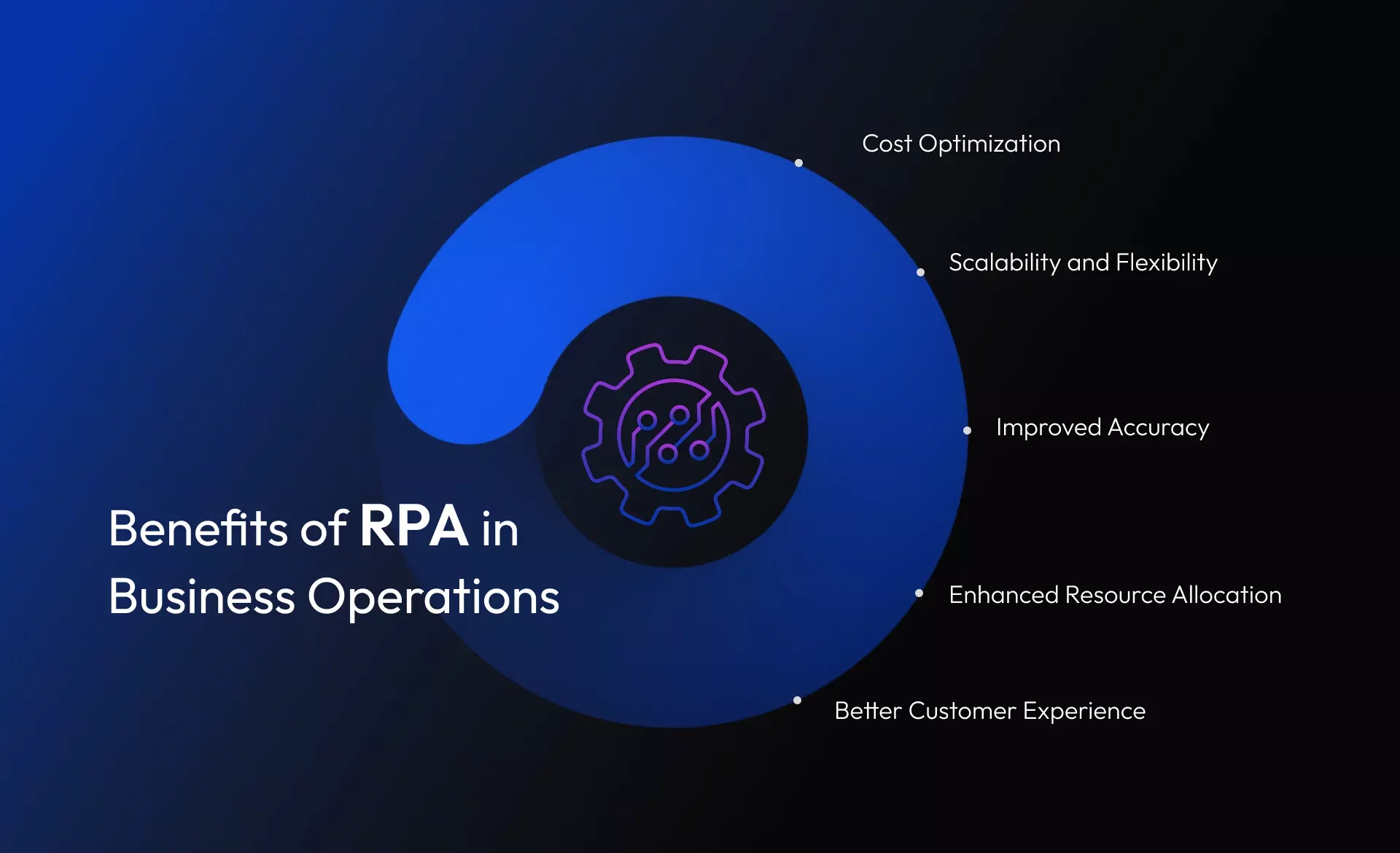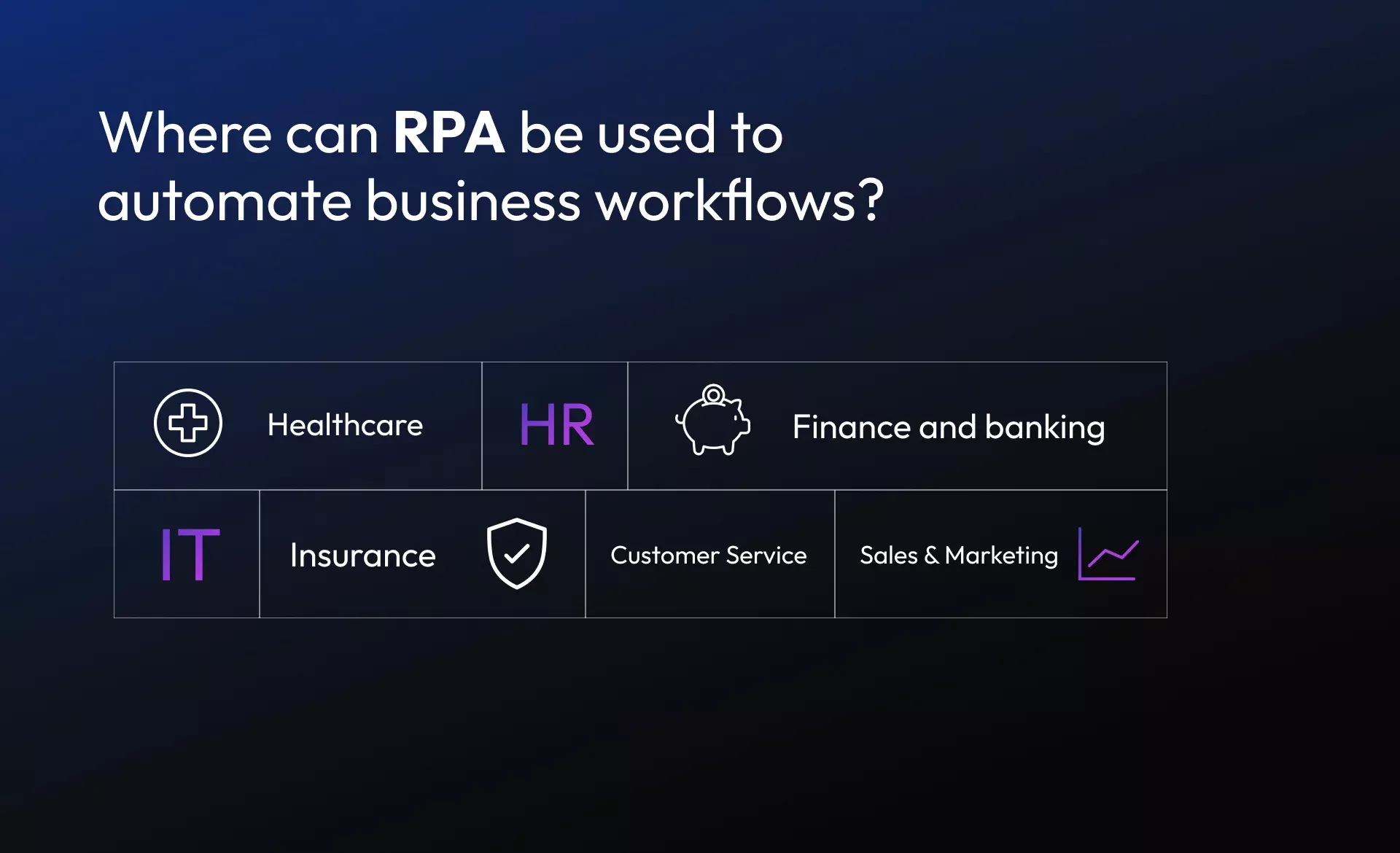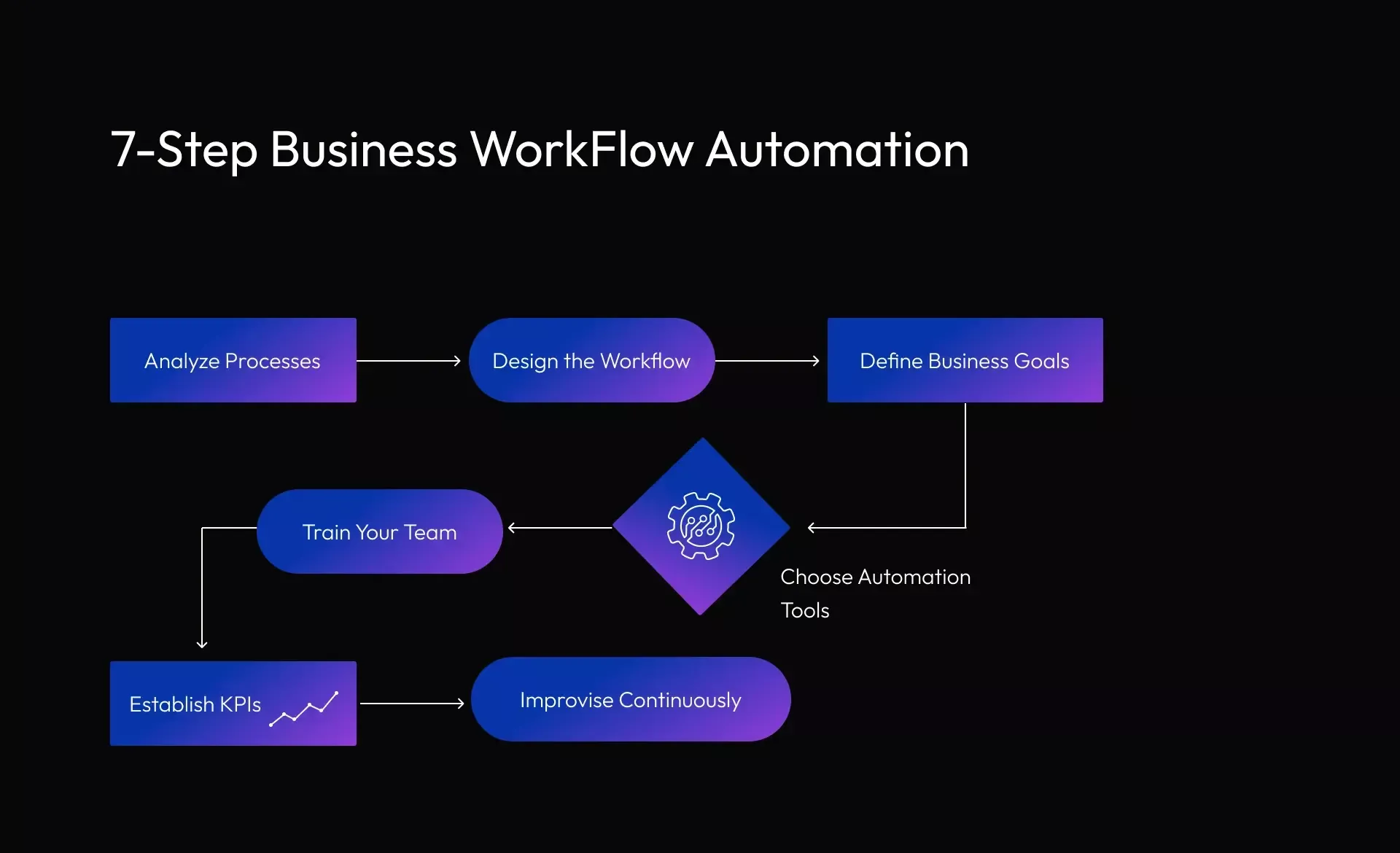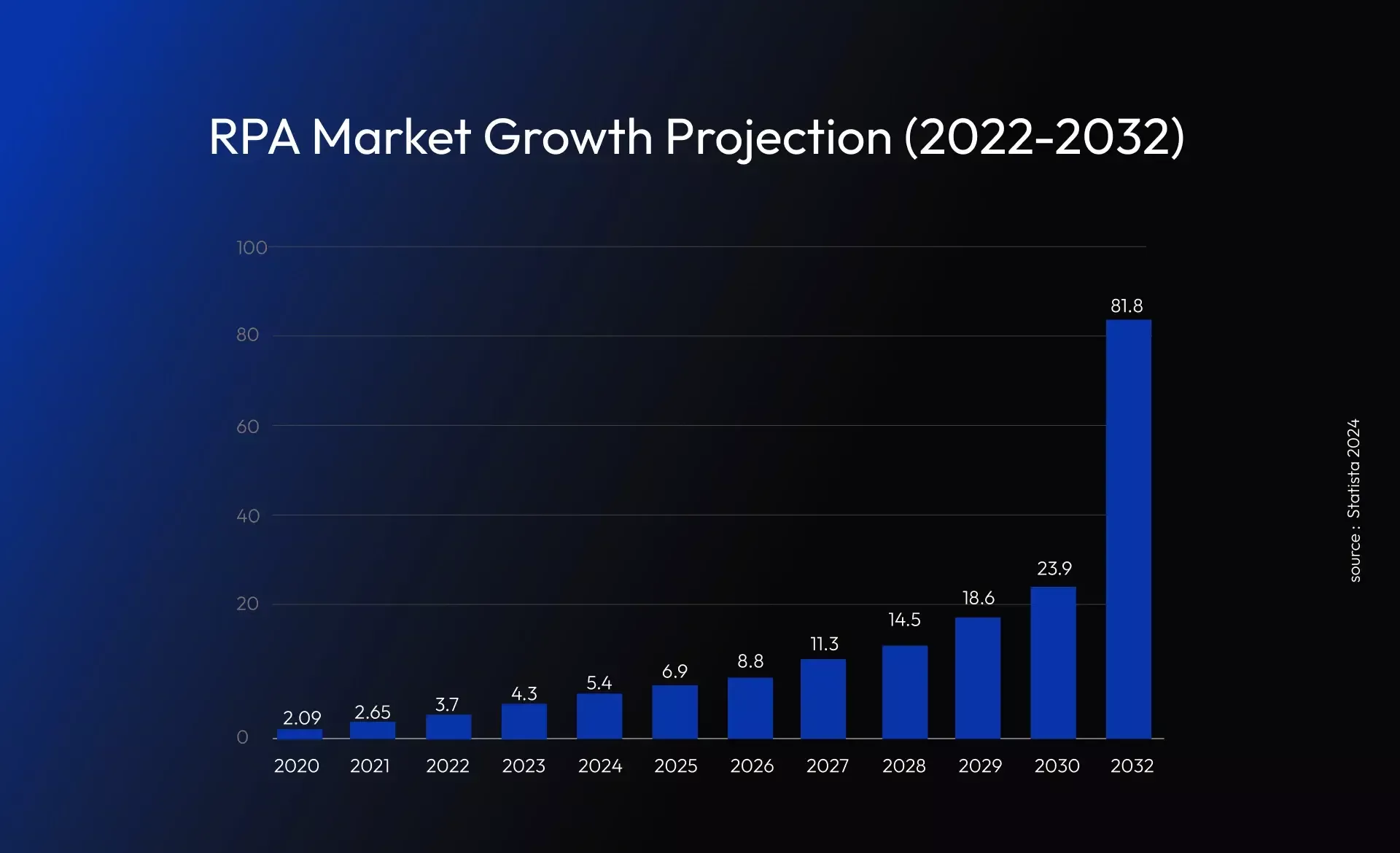The Power of Data Visualization Using Tableau
Revolutionizing Business Workflow Automation with RPA
Imagine a workplace where tedious, repetitive tasks are no longer a drain on your team’s time and energy. With business workflow automation, this vision becomes a reality.
But how does it work?
Often implemented through Robotic Process Automation (RPA), this technology has revolutionized the way organizations operate. By automating routine processes, RPA empowers businesses to optimize workflows, reduce errors, and maximize productivity without overburdening employees.
This enables businesses to redirect valuable human resources toward strategic, high-value initiatives.
Curious about how your enterprise can unlock this potential?
Keep reading to discover the key processes that can be automated with RPA, the steps to implement, and the benefits it brings.
The Role of RPA in Business Workflow Automation
Robotic Process Automation (RPA) applies artificial intelligence (AI) and machine learning (ML) to automate repetitive, rule-based tasks previously handled by humans. These software robots, or “bots,” interact with systems and applications as humans do, retrieving data, processing information, and completing tasks with precision and speed.
Think of RPA as your organization's tireless digital workforce, operating 24/7 accurately. It is becoming a critical weapon for companies seeking to boost efficiency and stay ahead of the competition.
Powered by artificial intelligence (AI) and machine learning (ML), it transcends simple automation to create secure and scalable workflows. It also acts as a guardrail for practical AI usage within larger orchestration platforms.
Why RPA Matters: Key Advantages in Business Operations
So, why are businesses increasingly adopting RPA? The answer is simple: the significant advantages it offers.

For companies looking to stay competitive, RPA has become an indispensable asset. It is gaining a lot of momentum across modern organizations and diverse industries, simplifying the way they approach their business processes in the following ways:
Enhanced Productivity and Resource Allocation
Automating repetitive business processes frees employees from mundane responsibilities, allowing them to concentrate on more valuable work. This shift not only boosts overall productivity but also increases job satisfaction and employee engagement while ensuring optimal use of resources.
Improved Accuracy
Manual processes are often prone to human error. RPA minimizes these mistakes by executing tasks consistently and precisely, enhancing data accuracy, compliance, and quality control across the board.
Cost Optimization and Increased Efficiency
RPA minimizes the need for manual work, leading to reduced operational costs. Organizations can redirect resources toward strategic initiatives, streamline workflows, and realize substantial efficiency gains.
Scalability and Flexibility
RPA equips businesses to scale operations swiftly, adapting to fluctuating workloads, seasonal demands, and evolving market conditions. This technology offers the agility to respond to changing business needs, ensuring a competitive edge.
Enhanced Customer Experience
Enterprises relying on RPA can provide superior customer experiences with faster response times, personalized interactions, and streamlined processes. Automating customer service tasks, such as email replies and chatbot interactions, enables businesses to deliver prompt and efficient support.
Where can RPA be used to automate business workflows?
Organizations across all industries stand to gain from the transformative power of workflow automation, streamlining operations, and driving efficiency.
To highlight its versatility, here are some business workflow automation examples showcasing how workflow automation can be applied across various industries and departments:
Healthcare
Workflow automation is significantly impacting the healthcare industry by simplifying complex, time-consuming tasks.
Medical providers can leverage RPA tools to create staff schedules and manage on-call rotations seamlessly. They also streamline critical processes like patient admissions, discharges, and the transfer of electronic health records.
By automating these routine tasks, healthcare workers can dedicate more time and energy to focus on their core responsibility, delivering high-quality patient care.
Human Resources
Automation is revolutionizing HR by simplifying processes like timesheet approvals, personnel management, and employee onboarding.
Processes like onboarding, often bogged down by repetitive administrative tasks, become seamless with Robotic Process Automation (RPA).
RPA can generate and send offer letters, trigger workflows when new accounts are created, and digitize employee paperwork with electronic capture systems. This eliminates manual effort, significantly reducing onboarding time—sometimes by as much as tenfold—while improving efficiency and making life easier for HR teams.
Similarly, payroll processing, a traditionally tedious task, benefits greatly from automation. RPA bots can standardize and automate tasks such as calculating salaries, overtime, commissions, bonuses, deductions, and expenses. Instead of manually reviewing spreadsheets or writing checks, a well-designed bot handles payments with accuracy and speed.

Finance and Banking
In the finance and banking sector, workflow automation is a powerful tool for streamlining operations and improving accuracy. Financial institutions and enterprise finance teams use automation to handle tasks like data entry and account approvals effortlessly. It also simplifies internal processes such as managing paid time off requests and processing salary adjustments, saving time and reducing errors while enhancing efficiency across the board.
Insurance and Home Warranty
Insurance involves a lot of paperwork that can be unloaded from the human workforce and sped up using RPA, riding on the trend of hyper-automation in the industry.
When paired with AI and ML, RPA streamlines several complex and repetitive processes in the insurance and home warranty sector, such as:
- Policy Management: RPA automates contract generation, policy updates, renewals, and reminders, offering a smoother experience for policyholders while reducing administrative tasks.
- Claims Management: Insurers can handle policy claims faster with automated data extraction with OCR, aggregating information, verifying claims, and detecting fraud.
- Underwriting: RPA pulls and verifies customer data, flags suspicious applications, and calculates policy rates for standard cases, speeding up the underwriting process and improving accuracy.
Information Technology
In IT, automation is a key enabler that supports DevOps teams and streamlines various processes.
From automating software development pipelines and code testing to managing data collection, service requests, and new account setups, automation boosts efficiency across the board.
Workflow automation examples in IT include using RPA to automate the testing of a new e-commerce app. This accelerates development cycles and ensures faster, more reliable product launches.
Customer Service
Business workflow automation in customer service speeds up ticket resolution and repetitive tasks like data entry, freeing up the workforce while improving customer experience.
For example, instead of manually filling out customer profiles, businesses now use RPA to automatically gather and update data, ensuring accuracy and saving time.
When launching an e-commerce website, for instance, businesses can integrate RPA to automate tasks like order tracking, processing returns, and handling customer inquiries. By instantly updating order statuses, addressing customer concerns, and managing returns, RPA enables faster response times. This leads to more efficient operations and significantly enhances the overall customer experience.
Sales and Marketing
Sales and marketing teams can use RPA to automate proposal approvals, connect salespeople with website leads, and generate task lists for scheduled meetings.
Another crucial part of sales workflows is invoice processing, which can also be automated with RPA. Manual invoice handling involves dealing with various file formats and attachments and can be time-consuming.
With RPA, invoices are processed automatically, extracting and organizing data without human input. This streamlines the process, reducing errors and freeing up resources for more strategic tasks.
7 Key Steps to Automate Business Workflows Successfully
Implementing business workflow automation is a strategic process that can transform your business operations. But, success lies in following a structured approach.

Here’s a step-by-step guide to help you navigate the journey:
1. Pinpoint Automation Opportunities
- Take a closer look at your operations to identify bottlenecks.
- Focus on repetitive, manual tasks prone to errors or inefficiency.
- Prioritize high-impact processes that consume significant time and resources.
2. Break Down the Process
- Map out every step of the process you plan to automate.
- Understand how tasks flow, where delays occur, and how information is transferred.
- This clarity is essential for designing an efficient automated workflow.
3. Set Business Goals
What does success look like for your organization?
Define clear goals, whether it’s:
- reducing costs
- boosting productivity
- eliminating errors
- improving speed
These objectives will shape your automation strategy.
4. Choose the Right Tools
Not all workflow business workflow automation tools are created equal.
- Research options that fit your needs, considering scalability, features, and integrations.
- Select the workflow automation software that aligns with your goals and budget, ensuring it can grow with your business.
5. Roll Out and Educate Your Team
- Introduce the automation tool with a well-thought-out implementation plan.
- Equip your team with training sessions and resources to familiarize them with the software.
- Encourage open communication to address any concerns and foster adoption.
6. Measure Performance and Refine
- Once workflows are automated, monitor them using key performance indicators (KPIs).
- Analyze metrics like time savings, error reduction, and ROI to determine whether the automation meets your goals.
- Use these insights to tweak and optimize workflows.
7. Focus on Continuous Improvement
- Automation isn’t a one-and-done process.
- Regularly review workflows, gather feedback from employees, and make adjustments to enhance efficiency.
- Stay agile to adapt to new challenges and evolving business needs.
Future Outlook
RPA has come a long way.
It is here to stay and, more so, within the wider scope of AI and combined with other complementary emerging technologies, like Gen AI.
According to a recent Statista report, the robotic process automation software market was valued at $3.7 billion in 2022. With a projected compound annual growth rate (CAGR) of 36.6% over the next decade, the market is set to surge to an impressive $81.8 billion by 2032.

This rapid growth highlights the increasing demand for automation technologies as businesses look for more efficient ways to streamline operations and improve productivity.
Partnering with Sundew for your business workflow automation journey sets you up for success. With our RPA expertise and a forward-thinking mindset, we offer comprehensive services, from initial consultation to workflow design, implementation, thorough testing, and ongoing support.
Schedule a consultation today, and let us help you drive your enterprise toward innovation and achieve sustainable growth.
Email us or Talk to us at +91-98367-81929 or Simply Contact Us through the website.
Let's Connect













